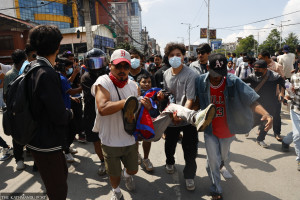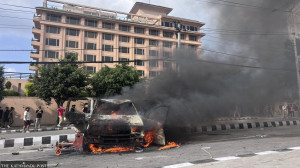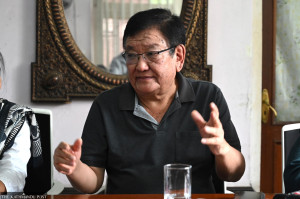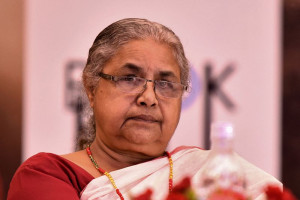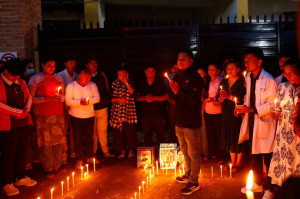National
Government wants top court to vacate its interim order on Upper Karnali Hydropower Project
The Supreme Court issued an interim order on November 3, raising a number of questions such as why the firm was taking time to manage funds.
Prithvi Man Shrestha
The government has moved the Supreme Court demanding it vacate its interim order on staying the decision to extend the deadline for GMR Energy to complete the financial closure of the 900-megawatt Upper Karnali hydropower project.
The government had moved the court in mid-November seeking to vacate its November 3 interim order, which threw the future of the project into uncertainty as GMR won’t be able to work towards financial closure now. Financial closure means ensuring enough resources to implement the project.
“We moved the court arguing that the interim order would further delay the works of the GMR and lead to a loss for the nation itself,” said Amrit Lamsal, spokesperson for the Investment Board Nepal, one of the defendants in the case. “The court has scheduled Monday for the hearing.” On July 15, the Cabinet had decided to extend the deadline by two more years.
Citing a number of reasons, a single bench of Justice Ishwar Prasad Khatiwada had issued the interim order not to implement the decision until the final verdict on the matter.
On September 19, 2014, the Investment Board Nepal and GMR Energy signed the Project Development Agreement, giving the Indian company two years to conclude financial closure. The deadline was extended further on January 8, 2017, by one year. On November 10, 2017, the Investment Board extended the deadline by another year against which a writ petition was under consideration in the Supreme Court.
The court also questioned why the Cabinet had to extend the deadline for financial closure while the law authorised the Investment Board to do so. “There can be no justification for extending the deadline for financial closure until 2024 as the agreement was signed for two years in 2014,” the court said.
According to Lamsal, the board has argued in its appeal that the Cabinet (not Investment Board) decided on extending the deadline as a party to the negotiation. The board has also justified the delay in extending the deadline for GMR Energy, arguing that the government sought to extend the deadline for financial closure after evaluating the Indian company’s willingness and performance to implement the project.
On October 9 last year, the government had formed a task force headed by immediate National Planning Commission vice-chairperson Biswo Poudel to study whether to extend the deadline of GMR Energy to complete the financial closure. Lamsal said that the deadline was extended as per the recommendation of the task force which had recommended deadline extension with certain conditions.
According to him, it has also been argued in the appeal that GMR Energy has made significant progress to sell 500MW of its power to Bangladesh through the Indian territory, which could open the door for Nepal to sell its energy to a third country.
Bangladesh signed a memorandum of understanding with India’s NTPC Vidyut Vyapar Nigam Limited (NVVN) to import electricity from the Upper Karnali scheme via India during Bangladeshi Prime Minister Sheikh Hasina’s visit to New Delhi in April 2017.
Bangladesh has already issued a letter of intent to India’s infrastructure giant GMR Group expressing its interest to enter into a contract to purchase 500 MW electricity from the Upper Karnali.
The power purchase agreement rate was also agreed upon between GMR Energy and the Bangladeshi authority at 7.712 cents per unit for a period of 25 years.
During the meeting of the Joint Working Group and Joint Steering Committee on the energy between Nepal and Bangladesh in late August, it was notified that the Bangladesh Power Development Board, NVVN and GMR were preparing to sign a trilateral power sales agreement.
“As far as I know, it was in the final stage,” said Aryal. “Given the progress made in that direction, the decision was taken to extend the deadline of the GMR’s licence to conclude the financial closure.”
However, the Indian private sector company has long been struggling to conclude financial closure which was awarded the 900MW Arun 3 in 2008 through international competitive bidding on a build, own, operate, and transfer model.
India’s state-owned SJVN Limited, which was awarded the 900MW Arun 3 project, is about to complete the construction of the project.
A lawyer familiar with the matter told the Post that both the government and the Indian company should share the blame for the court’s decision. “The Indian company took an unusually long time to conclude the financial closure,” said the lawyer. “The Investment Board didn’t take a timely decision on the deadline in the past, contributing to the current situation, even though GMR had applied for the deadline extension long ago.”
The lawyer, however, said that the two sides could extend the deadline through mutual consensus as per the project development agreement signed between the two sides.
Concerns have been expressed if the episode would discourage foreign investment in the country. “As the GMR was expediting its preparatory works, the court order halted its works,” said Lamsal. “It is bringing huge private sector foreign investments to Nepal. We are concerned if it would convey a negative message about the investment climate in Nepal.”
The estimated cost of the export-oriented project located on the Karnali river in Surkhet, Dailekh and Achham districts is $1.5 billion and is expected to take about five years to complete.
Nepal will receive 108 MW out of the remaining 400 MW for free, while GMR plans to sell the remainder to the Indian government.
At the end of the 25-year concession period, the project developer has to transfer the full ownership of the project to the Nepal government.
The power generated from the plant will be transmitted through a 400 kV double circuit transmission line up to the interconnection point of Power Grid Corporation of India.




 21.12°C Kathmandu
21.12°C Kathmandu







